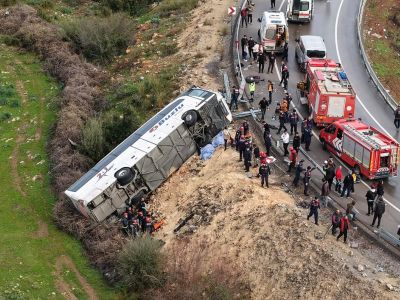Jordan's foreign ministry on Thursday denied official reports from Peru implicating Amman in a ring that smuggled guns from the kingdom to Colombian rebels via Peru.
Instead, a foreign ministry statement said that, several years ago, Jordan and Peru were involved in a "legal and official arms sales" deal under which weapons went from Amman to Lima only.
"We did not receive any protest note from the Peruvian foreign ministry concerning the sale of weapons from Jordan to Peru that took place several years ago," the statement said.
"The arms deal being talked about took place in an official and legal manner between the two countries (Jordan and Peru)," the statement said.
"The Jordanian government believes that Peru's government was unable to control the illegal activity of military men in Peru that led to the dispatch of the weapons to other parties," the statement said.
The foreign ministry said Jordan was ready to comply with any official request from Lima and to supply Peru with all the documents pertaining to the arms sales operation, which took place at an undisclosed time in the past.
Peruvian President Alberto Fujimori on Wednesday said his government lodged an official complaint with Jordan for "the illegal supplying of arms from this country destined for subversive groups involving Peru's territory and name."
After that, the Peruvian foreign ministry released the names of three Jordanian army officers who it alleged were "direct participants" in the smuggling operation.
The men were identified as Field Marshal Abdel Hafez Kaabneh, the former chief of staff, who was retired by King Abdullah II in March 1999. Also named were brigadier generals Abdel Razzaq Abdullah and Abdullah al-Ayasreh.
Fujimori had announced on Monday that the government had broken up a ring that supplied Russian-made assault rifles through Peru to Colombia's biggest and most violent insurgent group, the Revolutionary Armed Forces of Colombia.
"The arms were acquired in Amman," Fujimori said. "They were then shipped on a transport plane that stopped in the Canary Islands and Guyana before flying over Iquitos in northwestern Peru to be dropped.
"We have pictures of them leaving Amman," Fujimori said, adding that authorities also have pictures of the people participating in the ring, "and the Mercedes Benz of the implicated Jordanian general."
He said three drops took place in 1999, the first of them in March. The ring was broken up on August 15th of this year, when a fourth drop was foiled.
On Tuesday, a Jordanian official expressed "deep surprise" at those reports, saying contacts would be made with the Peruvian government and with Interpol to find out details about the case - AMMAN (AFP)
© 2000 Al Bawaba (www.albawaba.com)









